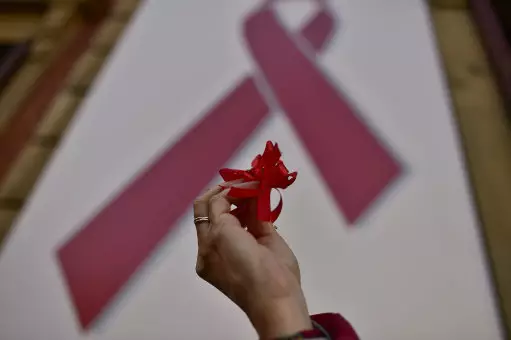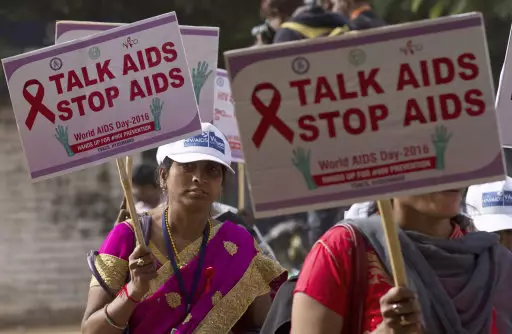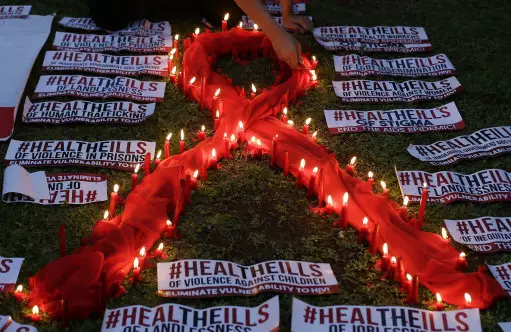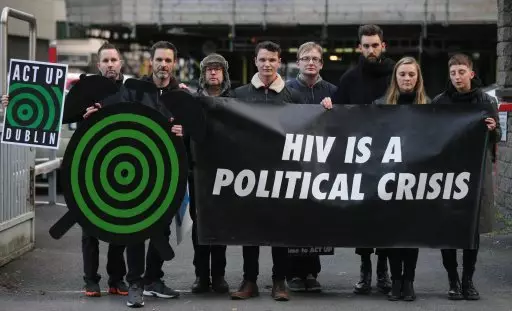
My taxi pulls up to the residential area in Manchester, where the George House Trust is based, and I walk into the centre for one of the country's largest providers of services to people living with, and affected by, the human immunodeficiency virus (HIV).
There are a total of 7,652 people living with HIV accessing care in the North West of England, according to the trust's data, and more than 100,000 individuals in the UK altogether. World AIDS Day has been held annually on 1 December since 1988, as an opportunity for people worldwide to unite in the fight against HIV, show their support for people living with HIV and to commemorate people who have died at a result of the illness.
Despite the work of the trust and other charities around the country, there remains a stigma attached to the virus, a lack of public information about how it is spread and what having the disease means for those who are diagnosed.
Although being diagnosed with HIV means making lifestyle changes, the condition is no longer a 'death sentence' and can now be managed with a number of drugs that allow those affected by the condition to have similar life expectancies to those not living with the condition.
The first person I speak to living with the disease is John, a 42-year-old man, who, along with his wife, received his diagnosis two months ago and is slowing beginning to come to terms with what the condition means for him.

Indian health workers, volunteers and students take out a health awareness procession. Credit PA
Advert
"Since being diagnosed I've met people who've known for five or six years and still feel as though they can't tell their parents," he tells me. "Nobody knows apart from me and my wife and close family.
"I've been positive for roughly 15 years from a previous partner who I'd had a sexual relationship with, but my first signs of being poorly were at the beginning of this year. I'd always been physically fit, but all of a sudden things started to dwindle."
One of the reasons the disease remains so stigmatised - and why some, like John, are reluctant to disclose the illness - is that many people's memories of the disease are still entwined with the 'AIDS crisis' in the late 1970s and 1980s, before treatments were developed that allowed those with the illness to continue to live full lives.
The period saw a rapid rise in the number of people diagnosed with the illness, before scientists fully understood how the disease was transmitted and today's treatment was available.
Misreporting of the condition in the media created a public hysteria. In 1985, at the height of the panic over the disease, a poll conducted by the New York Daily News found that 42 percent of respondents thought people with AIDS should be quarantined, despite the fact that the condition can only be passed on through blood, mother-to-child and sexual transmission.
A lack of education about the illness is one of the recurrent things people at the centre discuss with me. Public awareness of the realities of the condition is better than it was 30 years ago, however, there remains ignorance of how the disease is transmitted.

Activists march down the historic Hollywood Boulevard on the eve of World AIDS Day. Credit: PA
Advert
"Me and my wife have been really unlucky, we haven't done anything wrong. I'm sure there are lots of people out there - including straight men like me - who are dealing with it alone, because they're too scared to say anything," John says.
"The town where we live is like any town up and down the country, and as much as we hope people will be understanding, we know there are people who won't be. Whereas if I got told I had diabetes or epilepsy, I could tell the world, I still feel as though I couldn't tell my next door neighbour, because I don't know how they might react."
Last year it was estimated that 36.7 million people were living with HIV across the world and 16 people are diagnosed with condition in the UK every day. The George House Trust encourages anybody who has yet to be tested to do so, so they are aware of their status.
When I speak to Darren, a gay man living with the illness, he says one of the reasons the condition remains stigmatised is because people still don't feel comfortable talking about sexually transmitted diseases, especially one where groups that always faced discrimination - such as gay and bisexual men - are at a higher risk of infection.
"People still see you as 'tainted' or 'dirty'," he says. "The problem is, particularly with gay men, people have got their head around two men being together, holding hands and getting married, but the idea of what goes on in the bedroom a lot of the public aren't interested in. So you're still seen as dirty.

A vigil is held for people who died from HIV. Credit: PA
Advert
"A lot of that came in the '80s when they needed to do something to make people aware but they used a sledgehammer. As ever when people get stigmatised on anything a lot of it has to do with poor education and that they don't really know, so they'll latch on to hear-say or what their mate said at the pub."
Darren is open about his HIV status because he believes doing so can help others become more aware of the condition. "I've always been upfront about it. I think if I'm open about it, it might help other people to be more open about it," he adds.
Although gay and bisexual men, as well as the UK's black African population, remain at higher risk of contracting HIV, everyone who is sexually active could potentially become infected with the illness, especially if they have had unprotected sex.
Peter, the Lead Services Adviser at George House Trust, works with people living with the condition every day. Amongst the services offered by the charity are counselling for those coming to terms with their illness and peer-support led by those living with the condition, helping those recently diagnosed with disclosing their HIV status to friends and family.
"Being diagnosed is life changing, but it doesn't need to limit people in the way it used to. It's something that really should be becoming much more normalised, but it's not because of the amount of misinformation and myths that are still out there," Peter tells me.

Members of the an LGBT activist group protest in Dublin. Credit: PA
Advert
One of the reasons he thinks the illness is considered taboo is because of people still feel uncomfortable talking about sex and sexually transmitted infections.
"Anything with sex does have that attached to it - people do judge other people's behaviours. People think having HIV means they've slept with hundreds of people, or behaved in certain ways," he says.
"But where does that stop, because there's plenty of other things that can affect your health, like drinking and smoking, or even driving fast cars or doing dangerous sports? Everything we do has an element of risk to it. But because it is sex people get very twitchy about it - and feel superior."
It is estimated that 17 percent of people living with HIV in the UK are unaware of their status. This is one of the reasons the trust is keen everyone who is unaware of their status should get tested. Ultimately, catching it means being able to lead a higher quality of life with the condition.
Summing up the charity's attitude to testing, Peter says: "It's definitely worth having one and in all likelihood people will test negative. The worst thing you can do is have it and not get tested, because then you don't have access to treatments and wouldn't be getting checks. So, by the time you find out a lot of damage could already be done."
HIV testing is free and confidential, and anybody wishing to get tested should contact their local sexual health clinic or GP.
Advert
To find out more about George House Trust and to make a donation to support the work they do, you can visit their website.
Featured Image Credit: